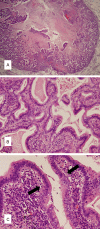KRAS mutation-positive bronchial surface epithelium (BSE)-type lung adenocarcinoma with strong expression of TTF-1: a case providing a further insight as for the role of TTF-1 in the oncogenesis
- PMID: 26823891
- PMCID: PMC4713677
KRAS mutation-positive bronchial surface epithelium (BSE)-type lung adenocarcinoma with strong expression of TTF-1: a case providing a further insight as for the role of TTF-1 in the oncogenesis
Abstract
Bronchial surface epithelium (BSE)-type lung adenocarcinoma is a subtype of non-terminal respiratory unit (TRU)-type lung adenocarcinoma originating in the bronchial surface epithelium. However, there are few known cases of BSE-type adenocarcinoma with marked expression of thyroid transcription factor-1 (TTF-1). This paper describes a very rare case of KRAS mutation-positive BSE-type adenocarcinoma that exhibited strong expression of TTF-1 that was putatively involved in oncogenesis. An 84-year-old woman, a never smoker, was referred to our hospital because of an abnormal chest radiograph. Chest computed tomography (CT) showed a solid mass lesion, 15 mm × 10 mm, with a relatively smooth margin in the left upper lobe. The patient underwent partial resection of the left upper lobe for strongly suspected lung cancer with a clinical stage of cT1aN0M0. Histopathological findings showed continuous migration of papillary, hyperplastic, atypical columnar tumor cells originating from normal bronchial surface epithelium, leading to a diagnosis of BSE-type adenocarcinoma. TTF-1 was strongly expressed in almost 100% of the tumor cells, which tested positive for the KRAS mutation. TTF-1 has recently attracted attention as an oncogene, and it is purportedly involved in the carcinogenesis and survival of lung adenocarcinoma cells. There is typically an inverse correlation between the respective expressions of KRAS and TTF-1, but in the present study, they appeared simultaneously and were both putatively involved as oncogenic driver alterations. This case is important in that it sheds some light on the largely unknown pathogenic mechanism of BSE-type adenocarcinoma.
Keywords: BSE-type adenocarcinoma; KRAS; TTF-1.
Figures




References
-
- Yatabe Y, Mitsudomi T, Takahashi T. TTF-1 expression in pulmonary adenocarcinomas. Am J Surg Pathol. 2002;26:767–73. - PubMed
-
- Maeshima AM, Omatsu M, Tsuta K, Asamura H, Matsuno Y. Immunohistochemical expression of TTF-1 in various cytological subtypes of primary lung adenocarcinoma, with special reference to intratumoral heterogeneity. Pathol Int. 2008;58:31–7. - PubMed
-
- Sumiyoshi S, Yoshizawa A, Sonobe M, Kobayashi M, Sato M, Fujimoto M, Tsuruyama T, Date H, Haga H. Non-terminal respiratory unit type lung adenocarcinoma has three distinct subtypes and is associated with poor prognosis. Lung Cancer. 2014;84:281–8. - PubMed
-
- Park WY, Kim MH, Shin DH, Lee JH, Choi KU, Kim JY, Park do Y, Lee CH, Sol MY. Ciliated adenocarcinomas of the lung: a tumor of nonterminal respiratory unit origin. Mod Pathol. 2012;25:1265–74. - PubMed
-
- Yatabe Y, Kosaka T, Takahashi T, Mitsudomi T. EGFR mutation is specific for terminal respiratory unit type adenocarcinoma. Am J Surg Pathol. 2005;29:633–9. - PubMed
Publication types
MeSH terms
Substances
LinkOut - more resources
Full Text Sources
Medical
Miscellaneous
